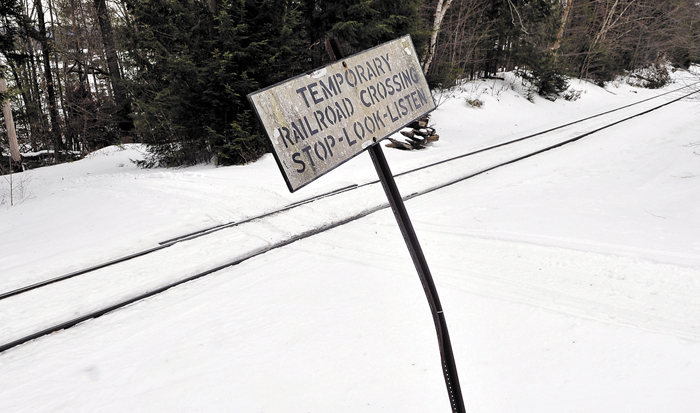A legislative vote with consequences for anyone who crosses railroad tracks on the way to private land has been pushed back to the next legislative session.
State legislators say the bill, L.D. 154, represents a rare chance for the state to negotiate with railroad companies on behalf of residents.
One issue at stake is whether the state will limit the fees that railroad companies charge to property owners for crossing agreements. No fee structure for crossing agreements is in place now, and Pan Am Railways raised the ire of property owners last year when it tried to increase annual fees dramatically for property owners in Belgrade. In at least one case, the railroad proposed an increase from $130 to $1,470. Other property owners who appeared to have a similar situation saw no fee increase.
Rep. Jarrod Crockett, R-Bethel, said the issue is too complex for the State House Judiciary Committee to recommend a solution this session.
“It’s a really big issue, and you can’t deal with it in a small, quick manner,” Crockett said. “You’re talking about liability for every foot of rail line in the state of Maine. You might have a lot of unintended consequences. That’s the goal, to get it right.”
The committee tasked Crockett with forming a study group of stakeholders to resolve the issue, which Belgrade property owners first raised in February 2012.
In addition to announcing the fee increases, the letters from Pan Am also told property owners they would have to begin carrying millions of dollars in insurance coverage for crossing accidents.
Belgrade was the first community to receive the letters, but Pan Am’s plan was to continue the process in every community in the state, according to Cynthia Scarano, Pan Am vice president.
After the issue went public in August, Scarano said the railroad would await the outcome of the legislative process before moving forward with attempts to increase fees or impose insurance requirements. On April 5, Scarano confirmed that the railroad will not move forward with the fee increases until the legislative process has played out.
In February, Rep. Dennis Keschl, R-Belgrade, introduced a bill that would absolve railroads of liability for accidents at the crossings. In exchange, Pan Am had indicated that it would craft friendlier crossing agreements with property owners.
During a public hearing in February, the bill came under fire from the Maine Trial Lawyers Association, the Small Woodlands Association and the Maine Snowmobile Association, in part because it could threaten the liability status of landowners who allow public recreation on their land.
Property owners also testified against the bill because it didn’t require railroads to uphold their end of the bargain by capping crossing agreement fees.
Crockett said because of interstate commerce laws, the state can’t impose a solution on the state. He said the legislation would give railroads a “big carrot” in the form of limited liability, so that there will be an incentive for them to protect property owners.
“We want something the railroads feel good about so we can get lower crossing fees for our people,” he said.
Crockett said the St. Lawrence and Atlantic Railroad has declined to be a part of the process, because it didn’t want to have its fees capped.
Crockett praised Keschl, who he said had done a lot of work to keep the issue alive in the face of the discouraging level of complexity.
“Those constituents owe a great deal to Dennis Keschl,” Crockett said. “Most people’s bills would have been dead by this point.”
Thomas and Kathleen Cassidy, who own a camp that can be accessed only by crossing a set of railroad tracks, also said they were thankful for Keschl’s efforts.
“What we’re hoping is that when this is all said and done, that we’re going to be treated fairly and equitably,” Cassidy said, “that the fees be reasonable if they’re allowed, and that everyone is treated the same.”
Crockett, an attorney, said the committee had chosen him because of his familiarity with property law.
The study group will need funding of less than $1,000 from the state Appropriations Committee, Crockett said, to reimburse group members who are legislators for travel expenses associated with its meetings.
Matt Hongoltz-Hetling — 861-9287
mhhetling@centralmaine.com
Send questions/comments to the editors.



Success. Please wait for the page to reload. If the page does not reload within 5 seconds, please refresh the page.
Enter your email and password to access comments.
Hi, to comment on stories you must . This profile is in addition to your subscription and website login.
Already have a commenting profile? .
Invalid username/password.
Please check your email to confirm and complete your registration.
Only subscribers are eligible to post comments. Please subscribe or login first for digital access. Here’s why.
Use the form below to reset your password. When you've submitted your account email, we will send an email with a reset code.